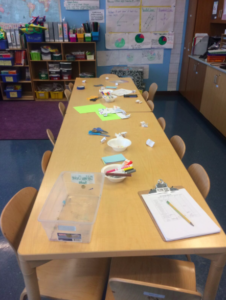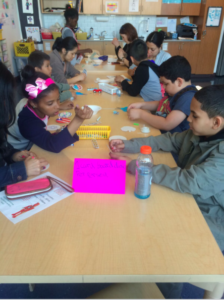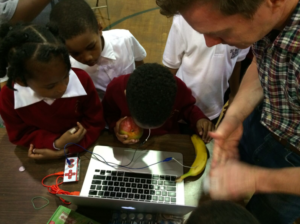Imagine if we encouraged students to ask questions, instead of just answering them.
Inquiry-based learning is as an approach to teaching and learning that puts students and their questions, ideas, and thoughts at the center of their learning experience and practice. This approach has countless benefits, including…
- nurtures student’s passions and interests
- empowers student voice and opinion
- increases motivation
- deepens understanding
- makes research meaningful
- puts problem-solving at the center of education
To quote Edutopia, inquiry-based learning goes far beyond simply asking a student what they want to know, or what they’re interested in: “It’s about triggering curiosity.” That curiosity, and hands-on, practical application and investigation, is central to real-world learning. Perhaps that is among the reasons why inquiry-based learning is surging in classrooms across the nation: A student-centered approach to learning and applying knowledge means students take responsibility for their learning and feel invested in building their own knowledge they develop self-motivation, and become better equipped in organizational, planning, and researching skills–qualities that are necessary to successful postsecondary outcomes, including college and careers. 
Erika Howard, teacher at STC school MC2 STEM High School in Cleveland, says “ the biggest benefit of inquiry-based learning is that students learn how to be independent and work in groups simultaneously,” noting that “they have to cooperate with each other, but at the same time they’re guiding their own learning.” The teamwork-individual work balance is a key element of inquiry-based learning. One method Ms. Howard uses frequently in her class to drive this kind of learning is the SOLE Model–Self Organized Learning Environment. A “SOLE” is a session during which kids work in groups to research the answers to big questions online. For example, 5th graders, using the internet and working in small groups, have to find “the difference between power and authority,” and share their results with the class.
SOLE is influenced by the work of Sugata Mitra, and is an extension of inquiry-based learning that enables students to be self-directed, promoting teamwork and allowing students to move at their own pace. According to SOLECLE, an organization dedicated to spreading SOLE practices across the greater Cleveland area and beyond, SOLEs are about “sparking communication, critical thinking, and creative skills”. These skills extend beyond knowledge illustrated on simple worksheets or fill-in-the-blanks, as Dr. Jeffrey McClellan & Justin Aglio wrote for GettingSmart: “Learning how to learn is more important than simple content knowledge. Students must develop skills such as critical thinking, problem solving, collaboration, communication, and creativity to lead in the future.” 
Additionally, creativity as a result of inquiry-based learning is palpable. Howard shared that, “Sometimes [kids] don’t come up with the answers I expected–sometimes they’re better, sometimes they’re off-base.” It is this process that enables growth that is a cornerstone of inquiry-based learning, something that is also a significant part of the over-arching curriculum at MC2 STEM High School. Cathy Kakleas, literacy coach at Hellenic Classical Charter School, agrees that “inquiry-based learning is a shared experience,” observing that it develops students’ “communication skills to articulate with their peers, listening skills to build on each others ideas and organizational skills to manage their research. All of this constitutes real world learning.”
Both schools share a commitment to questions and discovery. At MC2 STEM High School, student capstone projects center on “big questions, ”such as “just because we can, should we?” or “what does it mean to experience something? Examples include: Man vs. Machine, which “explores the advancement of technology and its effects on humanity,” and Vote With Your Voice, in which students “find the truth and fight for justice through an analysis of what is happening in the world today and what the politicians running for office truly stand for.” The “big questions” are modeled for students through capstones, with the hope that they will begin to ask their own.
Meanwhile, Hellenic Classical Charter School employs inquiry-based learning through Paideia seminars. Paideia is active learning that fosters critical and creative thinking through “Socratic seminars, growth of intellectual skills, and mastery of information.” Hellenic has been facilitating Paideia seminars with their students for more than a decade, and today you can observe them in kindergarten through 8th grade classes. Kakleas noted that “students listen to their peers’ perspectives and build on their ideas. Due to the open ended nature of the questions in a seminar, there is no wrong or right answer, allowing for students to take risks and express their ideas.” This enables a deeper understanding of topics as well as themselves, as students process multiple perspectives that encourage self-reflection. 
In these cases, lessons are student-driven and more concerned with the process, how something is learned and what is learned, rather than a single result, like a worksheet. Howard explains that, to her, it comes down to one question: “Do you know the answer? If not, can you find it?” She shared a story about a research lab manager she knows: “his number one question in interviews was always ’If you don’t know how to do something, what do you do?’.”The response he’s seeking? “Research until I figure it out.”
Independence, collaboration, and the ability to find, process, and present information are why inquiry-based learning helps us adapt to an ever-changing world and workforce, and allows students to become active drivers of their own educations.

